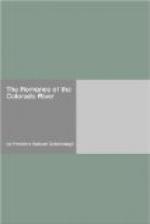directed irresistibly toward the accomplishment of
this conception. Again in 1868 he was in the
field with the same financial backing, to which was
added a small allotment from the Illinois Industrial
University at Champaign, Illinois, a State school.
All but Mrs. Powell and his brother Walter, of this
1868 party, returned East on the approach of autumn,
while with these and several trappers and hunters,
among whom were the two Rowlands, William Dunn, and
William Rhodes Hawkins, afterwards of his party to
explore the canyons, he crossed the range to White
River and wintered there near the camp of Chief Douglass
and his band of Utes. When spring came in 1869
he went out to Granger, on the Union Pacific Railway,
and there disposed of his mules and outfit, proceeding
immediately to Washington, where he induced Congress
to pass a joint resolution endorsed by General Grant
authorising him to draw rations from Western army posts
for a party of twelve men while engaged in making
collections for public institutions. Never was
assistance better deserved. Then he returned
to Illinois and obtained from the trustees of the Normal
University permission to again divert his salary and
the other funds to Western work. The trustees
of the Illinois Industrial University allotted him
five hundred dollars, and the Chicago Academy of Sciences,
through the influence of Dr. Andrews, the curator,
also contributed two hundred and fifty or five hundred
dollars. In addition some personal friends contributed
small sums.
The object proposed was to make collections in natural
history to be shared accordingly with the contributing
institutions. While these collections were one
of Powell’s objects, others were the examination
of the geology, and particularly the solution of the
greatest remaining geographical problem of the United
States, the canyons of the Green and Colorado rivers.
The Green, as has been explained in preceding pages,
was known as far as the Uinta Mountains, and here
and there at widely separated points on down to about
Gunnison Valley. But there were long gaps, and
below Gunnison Crossing as far as the Grand Wash the
knowledge of the canyons as already pointed out was
vague in the extreme. The altitude of Green River
Station, Wyoming, was known to be about six thousand
feet above sea level, and that of the mouth of the
Virgen less than one thousand. How the river
made up this difference was not understood and this
problem was what Powell now confronted. His fortitude,
nerve, courage, and war experience served him well
in this endeavour upon which he started, as previously
described, in the spring of 1869. The War Department
and perhaps the Smithsonian Institution, furnished
some instruments. This expedition met with so
many disasters that Powell deemed a second descent
in the interest of science desirable, and for a continuation
of his explorations, Congress voted in 1870 an appropriation
of ten thousand dollars. This second expedition




